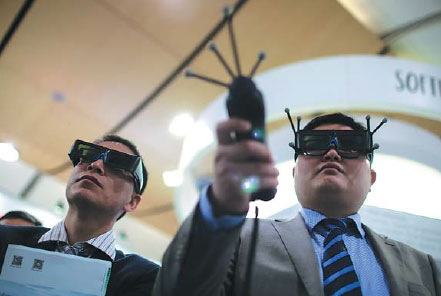Goals clear for bilateral trade
By Zhong Nan ( China Daily )
Updated: 2016-09-04
|
|||||||||
Business to thrive in areas including high-tech products, logistics services
The future of Chinese-German business ties will be based trade in high-end goods, and investment in the fields of infrastructure projects, hightech manufacturing and multimodel logistics services, said officials and business leaders from both sides.
Zhi Luxun, deputy director of the Department of Foreign Trade at the Ministry of Commerce, said even though both the Chinese and German economies have been hit by the global economic downturn, the degree of interdependence between the two remains stable in bilateral cross-industry trade.
Bilateral trade volume between China and Germany grew by 5.5 percent to 163 billion euros ($185 billion) in 2015. China in the meantime remained Germany's fourth-largest trade partner after the United States, France and the Netherlands, according to data released by the German statistics service in February.
"China will continue to export consumer goods in exchange for Germany's hightech products such as electronic products, construction machinery, vehicles and parts, and medical equipment," Zhi said. "Most of their imports are complementary. Therefore, it isn't direct competition."
Germany's investment in China, already the biggest from Europe at around 60 billion euros so far, has continued to climb in recent years, while direct investment in companies in China increased to 4 billion euros.
German engineering and electronics conglomerate Siemens AG will start building an innovation center in Suzhou, Jiangsu province, in September to develop digitalization-focused technologies, products and solutions.
The company established its first innovation center in intelligent manufacturing outside Germany in February in Qingdao, in eastern China's Shandong province.
Siemens China President Lothar Herrmann said his group will focus on the growth areas of electrification, automation and digitalization, as well as forming partnerships with more local companies to maintain stable growth.
Sales of Robert Bosch GmbH, another German technology and service supplier in China, also reached a record high of 77 billion yuan ($11.8 billion) in 2015, as it underwent its biggest expansion amid the country's industrial upgrading boom.
Peter Tyroller, the member of Bosch's management board responsible for the Asia-Pacific region, said the company continues to see many opportunities in the local market and also in the new normal of the Chinese economy, especially for its business with connected products and solutions.
"German economic and trade cooperation with China will increase for a long time," said Shi Yong, vice-president of Beijing-based China Machinery Industry Information Research Institute.
"Capable Chinese companies are also inclined to acquire German companies to gain cutting-edge technology, especially in chemistry, telecommunications, construction machinery, biology and steel."
Indeed, Chinese investment in Germany has been heavily concentrated in the high-tech sector and greenfield investments over the past five years. They are targeting more and more companies for acquisitions, such as leading robotics company Kuka AG, which just received a takeover offer from Chinese consumer products company Midea Group.
"With many manufacturing companies moving their facilities to Germany and inland China, there is an increasing need for logistics and transportation services in these two major markets in the world," Shi said.
zhongnan@chinadaily.com.cn
|
Two visitors experience the virtual reality technology by China's Huawei Technologies Co Ltd at this year's Hannover Messe industrial trade fair in Germany. Zhang Fan / Xinhua |
(China Daily 09/04/2016 page23)





